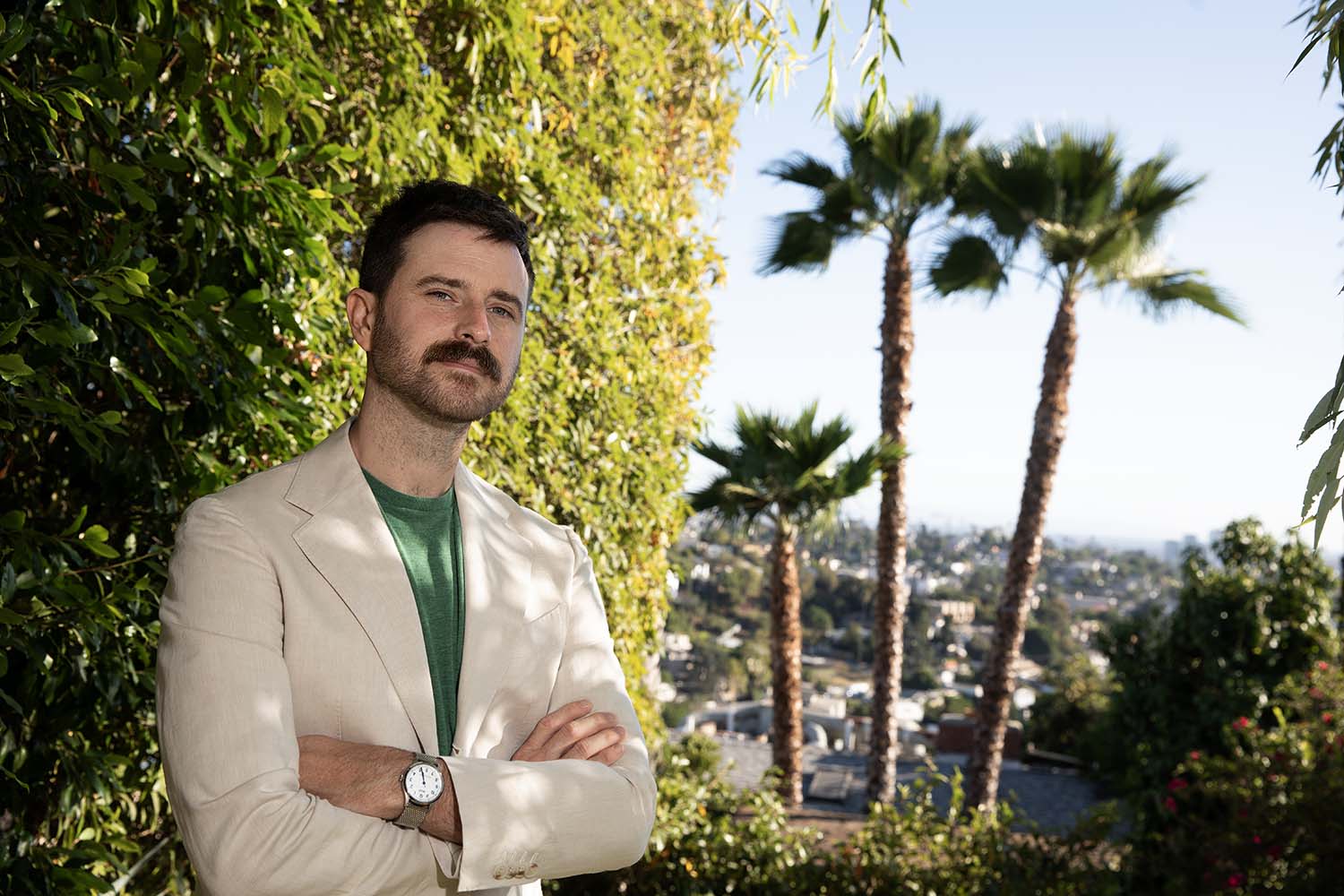Portrait by Dan Tuffs
GT Karber grew up in Arkansas, the son of a judge and a civil rights lawyer. He studied for an MFA in screenwriting at the University of Southern California and worked writing and developing scripts and ideas in Hollywood. In early 2022, during a pandemic lockdown, he came up with the idea for a new narrative logic puzzle, something of a cross between Cluedo and Sudoku, that he called Murdle. A collection of a hundred Murdle puzzles was the top-selling book in the UK the following Christmas. Eight more Murdle books have been produced, with millions of copies sold, and the series has been translated into 30 languages. A new puzzle, Bordergrams, involving “secret missions, shocking betrayals, and cryptic-style clues” is published this week (and, as an exclusive, is available to play in the pages of The Observer throughout September).
You worked on your own on the Murdle books but this one is a collaboration. How did it come about?
Some of the idea came from my partner of almost 15 years, Dani Messerschmidt. We had been thinking for a while of doing something with some sort of word connection puzzle. Writing any book is a pretty isolating thing. So this time Daniel Donohue, who is the most puzzly of our friends, did a lot of the work on the puzzle structure. And Amin Osman did a lot of the story narrative. I met Amin and Dani when we were at film school. Amin brings a kind of fast-paced, movie-like quality to the writing. But it’s not some high-minded reflection on the place of a spy in today’s society; it’s an adventure.
You have moved away from detective stories for this series.
Yes, I’ve killed so many people. I don’t say this to boast, but I do think Deductive Logico [Murdle’s main character] has solved more mysteries than any other literary detective; even Sherlock Holmes.
Is there an algorithm helping to do the heavy lifting for Bordergrams?
So much of the excitement of word puzzles depends on subtle human correspondence in language. There’s no AI that does that; AIs actually can’t solve Murdles above a certain size of grid. I think AI at the moment is like a 12-year-old who didn’t do the reading for their English essay, and is just bluffing. It’s funny. I always thought the key thing about robots was that they couldn’t tell lies; but then it turns out that AI is the ultimate bullshitter.
Do you see the success of the books as a backlash against screen time?
I have compulsive screen gameplay tendencies, and it’s not like I am playing those games thinking: “Wow, that was another satisfying three minutes.” So I always wanted Murdle to be something that you couldn’t do that with. It’s why we limited it online to one a day. Obviously, in the books, you can do a ton of them in one go if you like, but that’s not the same [as staring at a screen].
Are there Murdle films in the works?
The TV rights are currently with Amazon. But the gears move slowly. It’s one of the reasons I love doing books. I have developed TV and done stuff in Hollywood, and in publishing there’s so much less talking about the thing, and so much more doing the thing.
Are you still writing in other things forms?
I do really want to write a mystery novel, and I have an idea that I’ve been working on for that, but I don’t know when I’m going to find six months to do it. The great thing about puzzles is you can write two puzzles a day. And you don’t have to get back into the souls of your characters each time.
You probably know that The Observer invented the idea of cryptic crosswords almost a century ago. The paper’s first crossword setter, Edward Powys Mathers, also made a celebrated puzzle book, Cain’s Jawbone, which offered a huge cash prize to anyone who could put the loose pages of his story together in the right order. Have you ever been tempted to do something like that?
What is so smart about Cain’s Jawbone is that all you’ve got to do is arrange the pages. And then, of course, once you get into it, it drives you insane. I have thought about doing book-length puzzle structures like that. But I kind of feel like if I was going to write a whole novel, I might just write a regular one with each page in the right place.
Do you still have pinch-me moments about how Murdle worked out?
I do kind of believe it now. Because why else would I be so busy? I still have moments, though. We went to Rio de Janeiro for a book festival in June, one of the world’s largest. I was in the corner of this vast hall with a giant screen doing a live Murdle, and the next day I was on the cover of the main Rio paper, above an article about Trump bombing Iran. That felt surreal.
You’re the son of civil rights lawyers. Were you ever going to follow in their footsteps?
My mum so desperately wanted me to become an attorney. For years, after I was struggling to get a TV show made, she was still a bit: just go to law school. Murdle gave me a very good I-told-you-so moment.
Does this feel like a vocation? Do you see yourself doing this for ever?
One hundred per cent. I feel like I have finally stumbled on to something that gives me a sense of purpose. It sounds a little bit grandiose to talk about a collection of puzzles in that way, but I do have a sense of making something that provides joy to people. I love that it stepped out of my brain and has invited these millions of other people in. I’ve always been envious of people who are prolific. Someone like Charles M Schulz was amazing; doing [Peanuts] every day for all those years. I have a contract for 28 books. And eight are out. It better be a vocation, otherwise I’m in trouble.
Bordergrams by GT Karber, Daniel Donohue, Dani Messerschmidt and Amin Osman is published by Souvenir Press (£12.99). Order a copy at The Observer Shop for £11.69. Delivery charges may apply
Newsletters
Choose the newsletters you want to receive
View more
For information about how The Observer protects your data, read our Privacy Policy

